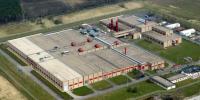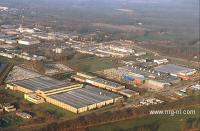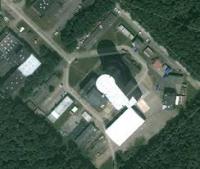As discretely as possible, the German power companies EON and RWE are trying to sell their holdings in URENCO, the tri-national company that produces weapons-grade uranium. The prominent German newspaper, Sueddeutsche Zeitung, reported that not only respectable potential buyers are lining up to bid and that intelligence services are on alert.
The German URENCO plant is located at Gronau, a small town only a stone’s throw away from the border with the Netherlands. And not far into that country is another URENCO plant at Almelo. Urenco, headquartered in Stoke Poges in Buckinghamshire and registered in the UK, is one third owned by the UK government, with the rest split between the Dutch government and two major German utilities, E.ON and RWE.
The newspaper incorrectly describes Gronau as “the last bastion of the nuclear industry in Germany”, which it is not. There is also a nuclear fuel plant at
Lingen and centrifuge research and development in Jülich, run jointly by a Urenco/Areva subsidiary, Enrichment Technology Company (ETC).
With a world market share of 31% the German-Dutch-British URENCO, which also operates plants in the UK and the USA, is one of the major suppliers of nuclear fuel. Almost unnoticed by the general public, URENCO keeps Germany a major player in nuclear industry, while nuclear power production is officially slated to end in the country itself in 2023. But power companies are planning largescale legal action for compensation. They also demand that taxpayers foot the bill for dealing with the nuclear waste produced.
As the newspaper points out, “URENCO possesses highly sensitive knowledge: the key to the atom bomb“. The one-third-each owners, which apart from the two power companies include the British and Dutch governments, want to sell the firm to investors. Ten
billion euros is one figure being mentioned. Bids to be accepted until the end of December.
It’s a scary scenario: “Up for sale is the simplest path to the atom bomb,” suggests Michael Sailer of the Eco-Institute in Darmstadt, an advisor on nuclear matters to the German government.
Finance circles say the list of potential buyers includes firms and hedge funds around the world, in Canada, Japan, Britain, Hong Kong, India and the Middle East. There’s even talk of questionable billionaires and states.
Experts say in Gronau alone enough highly enriched uranium to make a bomb could be produced in a few weeks.
If the state owners give up their controlling majority, it will get ever harder to protect the technology against unpermitted access, notes Sailer. “I find it irrespnsible to leave a technology with such destructive power to the market.“ One of the biggest worries is who will ultimately own URENCO after whoever buys it now. Rogue states or terror groups are possibilities being looked at.
The Sueddeutsche Zeitung says secret documents from the Netherlands make clear how far plans to sell up are advanced in London and The Hague.
German parliamentarians have been told by the government that intelligence services have been brought in to study potential buyers. The same is said to be happening in Britain and The Netherlands.
"Every transfer of knowledge of uranium enrichment technology also increases the knowledge of atomic weapon technology,“ warns Sylvia Kotting-Uhl of the German Greens, and calls on the German government to veto the sale. It can, but is said to fear legal action by URENCO.
“We demand the immediate closure of the Gronau uranium enrichment plant,“ writes a group of activists in Muenster, which is close to Gronau, as well as centrifuge research and development in Jülich, run jointly by a Urenco/Areva subsidiary, ETC.
The Aktionsbündnis Münsterland gegen Atomanlagen (SOFA) will host an international uranium transportation conference from 28-30. November in Münster.
www.sofa-ms.de, www.urantransport.de, www.kein-castor-nach-ahaus.de







Australian Aborigines get back atom bomb test lands
Maralinga traditional owners get land back
AAP - November 05, 2014 7:53AM
TRADITIONAL owners will finally get full access to their homelands at Maralinga with Defence
giving up its weapons testing range.
MARALINGA, in the South Australian outback, was the site of British atomic bomb testing during
the 1950s and 1960s.
Most of the Maralinga-Tjarutja land was handed back to indigenous people in 2009 after
rehabilitation work was completed.
Defence held on to the weapons testing range in the Woomera Prohibited Area.
But the 1782 square kilometre site will officially be handed back to the Aboriginal community on
Wednesday.
http://tinyurl.com/qf5zsyt
Radiation sickness from the tests
https://www.google.de/?gws_rd=ssl#q=sickness+Woomera+tests
The bomb has been grabbed yet
In the early seventies, the pakistanian physicist Abdul Qadeer Khan gathered the necessary techniques for the pakistanian bomb project while working for URENCO.